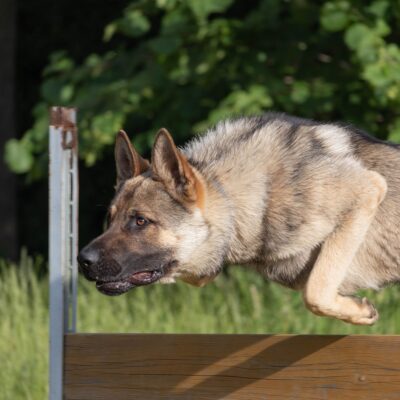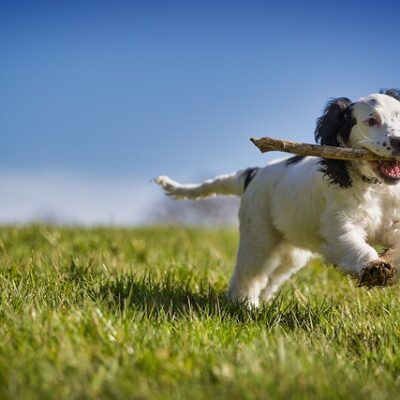Why do dogs sigh? Dogs sigh to communicate their emotions. Usually, these are contentment, disappointment, when relaxed, when resting, and to signal a health issue.
While many experts have different opinions on dogs sighing, most agree that when your dog sighs, they want to communicate. Since dogs cannot talk, sighs (and other noises like moans and groans) are their way of vocalizing their emotions (link) (link) (link) (link) (link).
Busy? Get Your Hands Paws On The Answers Quickly…
7 REASONS YOUR DOG SIGHS AND WHAT IT MEANS
Contentment
If your dog is lying down with their head on their paws and eyes are half-closed, this is a sign of contentment and satisfaction, and your dog is sighing because they are so happy.
Disappointment
If your dog is sighing with fully open eyes, they may be trying to communicate their disappointment to you. This could come from them realizing you cannot play with them at that exact moment or not the time for their walk.
Rest
If your dog just participated in a fun and busy play session or just went for a long walk, a sigh could be a sign that they are getting ready to rest. These sighs can signal that they are prepared to lie down and settle down for a bit.
Extreme Relaxation
Your dog may sigh in their sleep. If your dog is completely relaxed, with their head down and their ears soft, then it is just a sign of complete relaxation. They are so comfy and relaxed.
Health Problem
Sometimes, dogs may sigh to communicate to you that they are not feeling well or that they are feeling some discomfort. If it sounds like your dog is consistently sighing, it may be time to contact your veterinarian. Sighing that sounds long and persistent may mean that your dog is actually wheezing, which can be caused by inflammation in your dog’s airway or a blockage.
Inactivity
If your dog is not getting enough physical activity, they may sigh due to feeling a bit sluggish.
Pleasure
If your dog lets out a big sigh while you are rubbing their belly or after you just gave them their favorite treat, this may be from feelings of pleasure. Your dog is pleased with what is going on, and sighing is one way they show it to you.OTHER NOISES DOGS MAKE AND WHAT THEY MEAN
Barks
Dogs love to bark! And barking can mean many things. When trying to figure out the reason behind your dog’s bark, it is best to look at the context and pull from your dog’s former experience.
Typically, a higher-pitched bark is welcoming, whereas a lower-pitched bark is more of a warning. Here are some of the emotions your dog may be trying to convey when they bark.
Happiness – Your dog may bark from joy when you come home after a long day.
Warning – Your dog may bark when they see another dog on the sidewalk in front of their house and warn them that this is their territory.
Awareness – If someone knocks on the door and your dog barks, this is because they want to tell you that someone is there.
Fear – If your dog is crouched down and trying to make themselves look smaller while they are barking, this is a sign of fear.
Frustration – Dogs will bark out of frustration or boredom if they are left alone for a long time or cannot get something they want like their toy stuck under the couch.
Need – Sometimes, dogs will bark to get your attention if they need something (for example, they may bark to wake you up if they need to go outside in the middle of the night).
Whines
Whines can mean a few different things. If the whine rises in pitch near the end of the sound, your dog is showing signs of distress.
But if the whine that your dog is producing either drop-in pitch or stays at the same pitch level, they are communicating happiness and excitement!
Dogs will also whine when they want something, like some food, toy, walk, or just attention from you. The key to figuring what they want when they are whining is to look at the context. If your dog is near the door and whining, they are probably telling you that they want to go out.
Growls
Like whines, growls can mean different things. When a dog growls, most people think they are using the sound as a warning or a threat. And while that is sometimes the case, dogs also use growls to communicate play.
Play growls are noisier, of a medium pitch, and include no low rumbling sounds or teeth showing. You may have heard this play growl when playing tug with your dog, and they let out a little growl- they are not malicious, they are just playing.
Scientists have found that dogs can quickly tell the difference between a play growl and a warning growl, even though it is a little tricky for humans to decipher.
Howls
Howling is usually a sign of loneliness. This goes back to your pet dog’s ancestors of wolves- when dogs howl, they are calling out to their “pack.” Additionally, howling is often contagious, and if your dog hears another dog howling, they may choose to join in just for fun.
Certain dog breeds, like huskies, are very vocal howlers and will howl to “talk.” They make a howl like noises to communicate emotions such as happiness, frustration, and curiosity.
Groans
There are many reasons why your dog may groan. Sometimes, dogs will groan to get your attention.
Some dogs, especially as they get older, will groan when they get tired.
If your dog is frequently groaning, it may be a sign of illness. Frequent groaning may be a sign of osteoarthritis (which causes stiffness and pain in your dog’s joints), ascites (which is stomach bloating caused by fluid in the abdomen), or panosteitis (which is the rapid growth of bones).
Moans
Dogs moan for a variety of reasons. One reason that your dog might moan is that they want your attention. Your dog may be moaning to signal that they want to go for a walk, play tug with you, or have a treat.
Dogs may also moan if they are scared. A long moan is a signal that your dog is afraid of something and wants your protection.
Low Pitched Moans
These moans are a sign of contentment. Young puppies might moan more when they are close to their human, birth mother, or littermates.
Grumbles
Dog grumbling is a bit harder to distinguish between because dogs of different ages or breeds may grumble for various reasons. Younger dogs grumble to show that they are comfortable, whereas a grumble from an older dog may signal discomfort. Some breeds, like huskies and shepherds, are louder grumblers than other breeds.
FAQS
Why do dogs sigh like humans?
People sigh for many reasons- to express sadness, anger, contentment, or boredom. And dogs use sighing the same way. Dogs sigh to express emotions that they cannot speak to us.
Why does my dog huff at me?
When your dog makes a huffing and puffing sound, it is often a stress reliever. If your dog feels frustrated about something, they may huff to try to get their feelings of distaste across to you.
What does it mean when my dog stares at me?
Dogs stare at their humans to express love. Just like when people stare into the eyes of someone that they adore, dogs do the same thing. What’s more is that when you and your dog lock eyes, oxytocin (aka the “love hormone”) is released in both your brain and your dog’s brain, which causes both of you to feel good.
Additionally, sometimes dogs will stare at us to try to get our attention. For more information on other ways dogs try to get our attention, check out our article Why Do Dogs Paw You?
Why does my dog groan when I pick them up?
If your dog groans when you pick them up, your dog may be showing you that they are satisfied and comfortable with you holding them and petting them. Other reasons your dog may be groaning include wanting attention or showing you that they are not feeling well or are uncomfortable.
Looking for more pawsome posts? Check these out…
Can Dogs Eat Lettuce?
How To Make A Snuffle Mat
When Do Puppies Lose Their Teeth?
Can Dogs Eat Broccoli?
Can Dogs Eat Watermelon?
Disclaimer: Each dog is different, and every circumstance is different. All efforts have been made to provide accurate information. However, it is not provided by a qualified Veterinarian, Veterinarian Surgeon, or Behaviorist. The information provided is purely educational. The information should not be used as an alternative or substitute for medical care. If you have any health or medical concerns, contact a qualified Veterinary Surgeon or Veterinarian immediately.











No Comment! Be the first one.